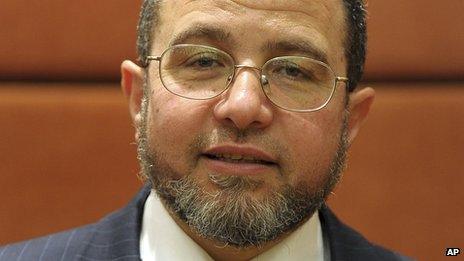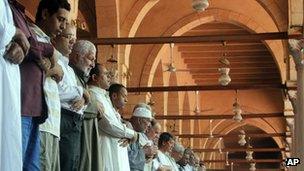Egyptian PM Hisham Qandil's beard: A new symbol of power?
- Published

Hisham Qandil is Egypt's first minister to sport a beard
New Prime Minister Hisham Qandil's facial hair is stirring debate in a nation where beards have traditionally been viewed as a symbol of Islamist hardliners.
It used to be a sign of religious piety. Now it is a sign of political sway. A reminder of how things are evolving very fast in Egypt.
Over the past six decades, those who sported a beard in the Muslim-majority country were considered hardliners.
They were under constant surveillance by the state security police, which used to side with the regime, and it was unusual to see a bearded man in any high-profile post in state institutions, including the police and the media.
Today, Egypt has a bearded prime minister.
After weeks of anticipation, Egyptian President Mohammed Mursi, himself bearded, surprised observers this week by assigning Hisham Qandil to form a new government.
The little-known technocrat served as the irrigation minister in the outgoing government of Kamal Ganzouri.
When first appointed in July 2011, Mr Qandil already stole the limelight for being the first ever minister to sport a beard.
At the time, many saw the bearded minister as a sign of positive change in Egypt, indicating that Islamists were no longer being "witch-hunted".
'Fear of Islamisation'
Now that Mr Qandil has been chosen as prime minister, however, his beard no longer seems all that welcome anymore - not after the rise of Islamists representing the new wave of political power in the Middle East.
Conventionally, wearing a beard is a practice by devout Muslim men who follow the teachings of the Prophet Muhammad to the letter.
But in Egypt, a country with long-standing secular traditions, many Muslim scholars do not view the beard as obligatory and frequently shave it off.
Social networking websites are flooded with sarcastic comments grilling Egypt's Islamist president for picking Qandil.
Some questioned if the only criterion for choosing the 50-year-old engineer by profession was the beard, which indicates his ideological leaning.
They accused Mursi of favouring Mr Qandil over high-profile figures who were tipped for the post, including Nobel laureates Mohamed ElBaradei and Ahmed Zewail.
"Only in Egypt is having a beard better than having a Nobel Prize," Hamdy Ibrahim said on Twitter.
Many voiced fears that the move foreshadows the Islamisation of Egypt.

Many devout Egyptian Muslims do not view growing a beard as obligatory
"Lesson learnt: just grow a beard!" tweeted Ahmed Sarhan who used to be key member in the campaign of Mr Mursi's competitor in the presidential elections, Ahmed Shafiq.
Gamal Fahmy, a liberal journalist and political activist, says that the public debate on social networking websites is revealing.
"The Muslim Brotherhood managed to appease Americans and the West but they failed to appease the Egyptians," he told the BBC.
"Egyptians are afraid of Islamising their nation."
'Heavy legacy'
Mr Qandil's beard is also wading into the political battle between the Muslim Brotherhood, the once-banned group which now has one of its veteran leaders in the presidential palace, and rival political parties.
After assuming power, President Mursi promised to appoint a patriotic and independent figure as prime minister, someone not tied to any particular political wing - especially not the Muslim Brotherhood's Freedom and Justice Party.
But Brotherhood critics insist that Mr Qandil is affiliated with the Muslim group.
"It is not just a matter of appearance," says Fahmy, the liberal activist.
"Qandil belongs to political Islam. He is a respected figure, and he may not be involved in a political party, but he is allied with the Muslim Brotherhood, at least mentally."
Others insist that, regardless of Mr Qandil's stance, his beard should not be portrayed as some sort of criminal charge.
"It is not a crime that he is wearing a beard. We should not be throwing accusations based only on appearance," Salah Abdel Maqsoud, a veteran journalist and political commentator, told the BBC.
"Let's just see what the man's choices for ministers and aides are going to be. Let's see how he is going to tackle the endless challenges awaiting him. It is a very heavy legacy."
Mr Qandil's appointment is likely to disappoint people in business circles, who had hoped for someone with extensive economic expertise to breathe life into the country's crippled economy.
In his first official speech, Mr Qandil - who is also Egypt's youngest prime minister - vowed his cabinet would be made up of technocrats.
He also pledged to focus on the promises President Mursi made in his 100-day programme, on securing bread, fuel and cleanliness, easing traffic congestion, and ending the security breakdown afflicting Egypt since the 2011 revolution.
"You will hear this from me quite often in the coming period," Mr Qandil said in his televised statement.
"We have to put in so much effort and work very hard to achieve the goals of the revolution. There is just so much to do."
- Published24 July 2012
- Published3 August 2012